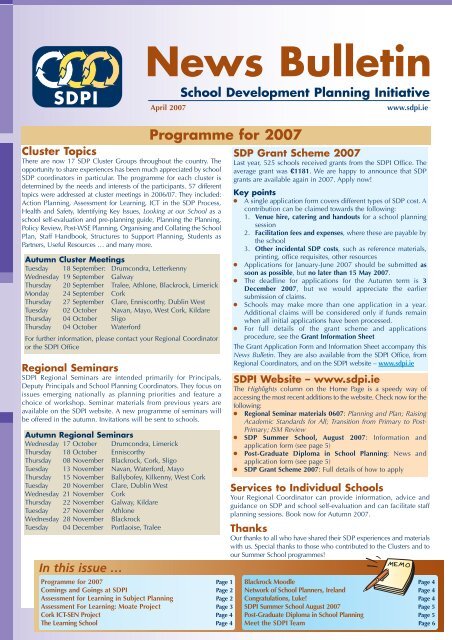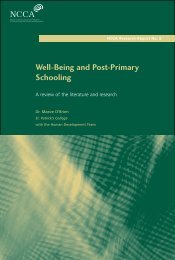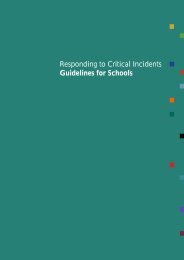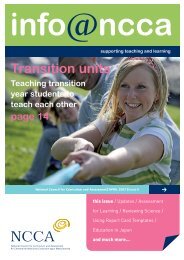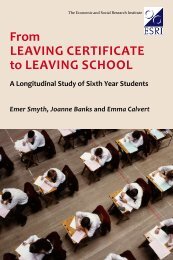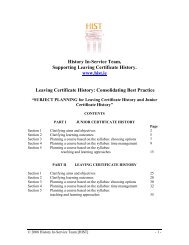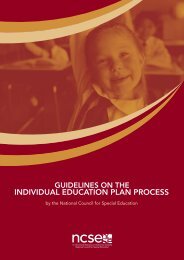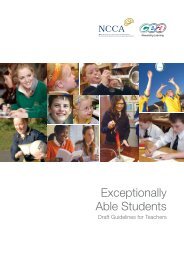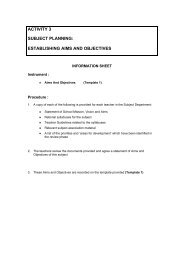SDPI News Bulletin - April 2007 - School Development Planning ...
SDPI News Bulletin - April 2007 - School Development Planning ...
SDPI News Bulletin - April 2007 - School Development Planning ...
- No tags were found...
You also want an ePaper? Increase the reach of your titles
YUMPU automatically turns print PDFs into web optimized ePapers that Google loves.
<strong>News</strong> <strong>Bulletin</strong><strong>SDPI</strong><strong>April</strong> <strong>2007</strong><strong>School</strong> <strong>Development</strong> <strong>Planning</strong> Initiativewww.sdpi.ieCluster TopicsThere are now 17 SDP Cluster Groups throughout the country. Theopportunity to share experiences has been much appreciated by schoolSDP coordinators in particular. The programme for each cluster isdetermined by the needs and interests of the participants. 57 differenttopics were addressed at cluster meetings in 2006/07. They included:Action <strong>Planning</strong>, Assessment for Learning, ICT in the SDP Process,Health and Safety, Identifying Key Issues, Looking at our <strong>School</strong> as aschool self-evaluation and pre-planning guide, <strong>Planning</strong> the <strong>Planning</strong>,Policy Review, Post-WSE <strong>Planning</strong>, Organising and Collating the <strong>School</strong>Plan, Staff Handbook, Structures to Support <strong>Planning</strong>, Students asPartners, Useful Resources … and many more.Autumn Cluster MeetingsTuesday 18 September: Drumcondra, LetterkennyWednesday 19 September GalwayThursday 20 September Tralee, Athlone, Blackrock, LimerickMonday 24 September CorkThursday 27 September Clare, Enniscorthy, Dublin WestTuesday 02 October Navan, Mayo, West Cork, KildareThursday 04 October SligoThursday 04 October WaterfordFor further information, please contact your Regional Coordinatoror the <strong>SDPI</strong> OfficeRegional Seminars<strong>SDPI</strong> Regional Seminars are intended primarily for Principals,Deputy Principals and <strong>School</strong> <strong>Planning</strong> Coordinators. They focus onissues emerging nationally as planning priorities and feature achoice of workshop. Seminar materials from previous years areavailable on the <strong>SDPI</strong> website. A new programme of seminars willbe offered in the autumn. Invitations will be sent to schools.Autumn Regional SeminarsWednesday 17 October Drumcondra, LimerickThursday 18 October EnniscorthyThursday 08 November Blackrock, Cork, SligoTuesday 13 November Navan, Waterford, MayoThursday 15 November Ballybofey, Kilkenny, West CorkTuesday 20 November Clare, Dublin WestWednesday 21 November CorkThursday 22 November Galway, KildareTuesday 27 November AthloneWednesday 28 November BlackrockTuesday 04 December Portlaoise, TraleeIn this issue …Programme for <strong>2007</strong>Programme for <strong>2007</strong> Page 1Comings and Goings at <strong>SDPI</strong> Page 2Assessment for Learning in Subject <strong>Planning</strong> Page 2Assessment For Learning: Moate Project Page 3Cork ICT-SEN Project Page 4The Learning <strong>School</strong> Page 4SDP Grant Scheme <strong>2007</strong>Last year, 525 schools received grants from the <strong>SDPI</strong> Office. Theaverage grant was g1181. We are happy to announce that SDPgrants are available again in <strong>2007</strong>. Apply now!Key points● A single application form covers different types of SDP cost. Acontribution can be claimed towards the following:1. Venue hire, catering and handouts for a school planningsession2. Facilitation fees and expenses, where these are payable bythe school3. Other incidental SDP costs, such as reference materials,printing, office requisites, other resources● Applications for January-June <strong>2007</strong> should be submitted assoon as possible, but no later than 15 May <strong>2007</strong>.● The deadline for applications for the Autumn term is 3December <strong>2007</strong>, but we would appreciate the earliersubmission of claims.● <strong>School</strong>s may make more than one application in a year.Additional claims will be considered only if funds remainwhen all initial applications have been processed.● For full details of the grant scheme and applicationsprocedure, see the Grant Information SheetThe Grant Application Form and Information Sheet accompany this<strong>News</strong> <strong>Bulletin</strong>. They are also available from the <strong>SDPI</strong> Office, fromRegional Coordinators, and on the <strong>SDPI</strong> website – www.sdpi.ie<strong>SDPI</strong> Website – www.sdpi.ieThe Highlights column on the Home Page is a speedy way ofaccessing the most recent additions to the website. Check now for thefollowing:●●●●Regional Seminar materials 0607: <strong>Planning</strong> and Plan; RaisingAcademic Standards for All; Transition from Primary to Post-Primary; ISM ReviewSDP Summer <strong>School</strong>, August <strong>2007</strong>: Information andapplication form (see page 5)Post-Graduate Diploma in <strong>School</strong> <strong>Planning</strong>: <strong>News</strong> andapplication form (see page 5)SDP Grant Scheme <strong>2007</strong>: Full details of how to applyServices to Individual <strong>School</strong>sYour Regional Coordinator can provide information, advice andguidance on SDP and school self-evaluation and can facilitate staffplanning sessions. Book now for Autumn <strong>2007</strong>.ThanksOur thanks to all who have shared their SDP experiences and materialswith us. Special thanks to those who contributed to the Clusters and toour Summer <strong>School</strong> programmes!Blackrock Moodle Page 4Network of <strong>School</strong> Planners, Ireland Page 4Congratulations, Luke! Page 4<strong>SDPI</strong> Summer <strong>School</strong> August <strong>2007</strong> Page 5Post-Graduate Diploma in <strong>School</strong> <strong>Planning</strong> Page 5Meet the <strong>SDPI</strong> Team Page 6
<strong>SDPI</strong> <strong>News</strong> <strong>Bulletin</strong> <strong>April</strong> <strong>2007</strong><strong>SDPI</strong>Comings and Goingsat <strong>SDPI</strong>October 2006 saw the departure of twomembers of the <strong>SDPI</strong> Team for pasturesnew.Paul Fields andJacqui DillonPaul Fields,Regional Coordinatorforthe South-East,was appointedDirector ofKilkennyEducationCentre. Duringhis time with<strong>SDPI</strong>, Paul wasone of the pioneers in the developmentof the <strong>SDPI</strong> Summer <strong>School</strong>s, the HigherDiploma in <strong>School</strong> <strong>Planning</strong>, and theRegional Clusters. He devised a widerange of SDP resource materials, mostnotably for guidance planning.Jacqui Dillon, Regional Coordinator forthe West/North-West, was appointedPrincipal of Magh Ene College inBundoran. Jacqui played a key role in theexpansion of <strong>SDPI</strong> services in the North-West, establishing a number of RegionalClusters and providing outreach supportfor participants in the diploma course.She was particularly noted for her workin relation to Anti-Bullying.Paul and Jacqui were highly valued notonly by their colleagues on the <strong>SDPI</strong>Team but also by the many schools thatavailed of their services. We wish themevery success in their new positions.New Regional CoordinatorWe are delighted to welcome our newRegional Coordinator for the South-East,Ken Moroney. Kenis based in KilkennyKen MoroneyEducation Centreand will serveschools in Carlow,Kilkenny, Wicklow,Wexford, and partof Dublin. ADubliner, he hasspent his entirecareer in the South-East, having taught for 16 years in St.Mary’s College in Arklow and worked asprincipal in Our Lady of LourdesSecondary <strong>School</strong> in Rosbercon, NewRoss, since 1998. He is a graduate of theNUI Galway/<strong>SDPI</strong> Higher Diploma in<strong>School</strong> <strong>Planning</strong>.Achieving improved outcomes for studentsin the classroom is the key aim of subjectplanning. One response to this challenge isthe increasing popularity of ‘assessment forlearning’ in subject action plans. AFL (orformative assessment) is backed by apowerful body of recent internationalresearch and has been identified by theOECD as providing learning improvementsthat are ‘amongst the largest ever reportedfor educational interventions (OECDFormative Assessment Report: 2005)’.AFL Classroom TechniquesAFL aims to enrich the exchange ofinformation between teacher and studentabout any given learning task. From framinglessons clearly in terms of stated learninggoals, through imaginative and thoughtprovoking use of questioning, to givingprecisely focused feedback to studentswhich both encourages them and charts theirnext steps in the learning cycle, AFL includesa wide range of practical classroomtechniques that can be readily tried withstudents of all ages. There is a greateremphasis on active student learning andcollaboration. AFL has been shown to raisestandards of achievement for all levels ofability in both conventional school tests andpublic examinations. The most dramaticgains, though, were among studentsexperiencing learning difficulties.AFL and Subject DepartmentsSubject departments often start by analysingtheir own assessment practices in the light ofwhat they have learnt about AFL from inservicesessions and relevant literature. Theycan then selectively pilot certain AFLstrategies with specific groups of students foran agreed period of time. Typical examplesof such approaches would be:◆Assessment for Learningin Subject <strong>Planning</strong>systematically delaying answering timeand operating a ‘no hands up’ policy forquestioning, or◆ using comment only marking inhomework or class tests where studentslearn what they have done well, where inrelation to the learning goal they need toimprove, and what their next steps are toachieve that improvement.Subject departments then evaluate theseactions in relation to the goals of improvedlearning and greater student engagement.Staff can then come together as a whole toshare the evaluations of different approachestried by various departments and discusswhether and how student motivation andachievement are benefiting.Strengths of AFL in SDPOne of the great strengths of AFL in schooldevelopment planning is that it allows forthis type of practical initiative, which helpsteachers to reflect on their own teachingstyles and to adopt at their own paceteaching strategies that can support theirpractice. Above all, it moves subjectplanning into action planning so that realchanges are experienced in the classroom.Over time, as well, there can be a shift in theclassroom culture. Teachers and studentsdevelop a more collaborative and reflectivepartnership in promoting learning. Fewerstudents get left out or are able to opt out.This more self-conscious and activeapproach to learning is one of the statedaims of the OECD for lifelong learners in the21st century.<strong>SDPI</strong> is working actively with several schoolsin promoting AFL as a focus of subjectdevelopment planning. We are alsodeveloping materials and sourcing technical,subject specific information to help schoolsdevise effective action plans.AFL Online ResourcesThere are many useful, freely availableonline resources. These include:◆ A summary of AFL principles and samplematerials on the NCCA website,www.ncca.ie (Junior Cycle Reviewsection)◆ An influential summary of literaturefindings on the Phi Delta Kappan website atwww.pdkintl.org/kappan/kbla9810.htm◆ An overview of AFL characteristics andan AFL Checklist on the QCA website atwww.qca.org.uk/7658.html◆ Resource materials from the Scottishnational AIFL initiative on the Learningand Teaching Scotland website atwww.ltscotland.org.uk/assessAssessment for LearningKey Characteristics◆ Shared learning goals◆ Using effective questioning techniques◆ Using marking and feedback strategies◆ Peer and self-assessment(QCA)See also NCCA <strong>News</strong>letter, info@ncca.ie,Issues 1, 3, 4 and 5<strong>School</strong> <strong>Development</strong> <strong>Planning</strong> Initiative for Post-Primary <strong>School</strong>swww.sdpi.ie
<strong>SDPI</strong> <strong>News</strong> <strong>Bulletin</strong> <strong>April</strong> <strong>2007</strong>Assessment For Learning (AFL)Moate Community <strong>School</strong> Pilot ProjectWhile a number of individual teachers had‘dabbled’ in various aspects of Assessmentfor Learning, the concept really had itsinception in Moate Community <strong>School</strong> atthe beginning of this school year, with abrief presentation to staff on the merits ofthis approach to assessment.Such was the level of interest in Assessmentfor Learning among teachers, that it wasdecided to implement a ‘pilot project’ inthe area of homework.With the help of our <strong>SDPI</strong> Regional Coordinator,Gerry Watchorn, a group of 4‘volunteers’, Noreen Peredo (Historydept.), Alan Stenson (Geography dept.),Des Dolan (Business Studies dept.), andGrainne O’Kennedy (Geography dept.), setabout planning the homework project.An inaugural meeting of the ‘core four’ ledto decisions on which class groups andsubjects would be chosen by each teacherin order to target a cross section ofstudents, all at Junior Cycle Level. Ouraims at the outset were to:● Promote student motivation in class● Help students to become ‘assessors’ oftheir own work i.e. to criticallyexamine their own performance● Foster a more student-centred approachto homework and hence classwork● Engage parents in the homeworkprocess● Reinforce our school’s homework policySome of the following points,we felt, were key to thesuccess of the entire project:● The selected groups of pupils were tobe informed in advance of thecommencement of the project● Staff were to be kept updated on theprogress of the initiative● A newsletter was to be issued to parentsat the beginning of the implementationphase●●●The time duration of the trial would bedefinite (Ours ran for the six weekperiod following the Christmas break)Course work/assignments would beplanned in advance for the six weekperiodExemplars would have to be prepared inrelation to 5/6 homework assignments● The teacher would identify thehomework assignment at the beginningof class and give the class 5 minutes atthe end to start it (this enthuses thestudent for finishing it later on)● A class test would be given about 3/4weeks into the project to measure theeffectiveness of the pilot project●There would be an honest evaluation atthe endOn completion, the following was theappraisal of the process by the ‘core four’:What worked well:● Outlining expectations regardinghomework● A more structured approach to homework● Having exemplars so students couldsee exactly what was expected of them– this seemed to help weaker studentsin particular● ‘RUBRICS’ – A rubric for a weeklyessay provided detailed guidelines interms of expectations and levelsachieved. It also provided invaluableinsight for the student in terms of selfevaluation● <strong>Development</strong> of folders generatedpride and promoted organisation● Homework feedback stickers● Support/ideas from other members ofthe pilot scheme●●●●●Parental involvementSeeing the obvious improvement instudents’ homework and overallperformance – test results improvedThere was a very dramatic increase inoverall performance and test scoresparticularly with weaker studentsFeedback from students/parents wasvery goodOverall, an excellent experienceWhat we found challenging:● Putting together exemplars was timeconsuming● It took almost a full class to gethomework corrected● A number of absences in the small classmeant work got a bit broken up at times● Progress with the course was held backdue to spending a lot of time on AfL,but as time went on this improved● Ensuring that students used the‘Rubrics’ effectively required constantpractice and reinforcement for the firstweek or two, but then worked very well● There was an increase in workrequired, in terms of preparation ofrubrics, but again with practice, thisbecame automaticThe school management facilitated theprocess where possible by affordingteachers preparation time, for a two-hoursession, and by freeing them up, on theoccasions that Gerry checked in with us tore-energise us.The school wishes to acknowledge thesignificant effort and personal dedicationthat went into this initiative by the staffinvolved.Left to right: Des Dolan,Gráinne O’Kennedy,Maura Murray (Deputy Principal),Noreen Peredo, Alan Stenson.<strong>School</strong> <strong>Development</strong> <strong>Planning</strong> Initiative for Post-Primary <strong>School</strong>swww.sdpi.ie
<strong>SDPI</strong> <strong>News</strong> <strong>Bulletin</strong> <strong>April</strong> <strong>2007</strong>Cork ICT-SEN Collaborative ProjectAn exciting new collaborative pilot project has been emerging inCork. This project examines the development of best practice in theapplication of Information and Communication Technologies forteachers involved with pupils with Special Educational Needs (SEN).<strong>SDPI</strong> has been specifically engaged in assisting school teams inplanning the development of their Learning Support Departmentand in the area of policy formulation.This project is being piloted in the Co. Cork VEC schools initiallythrough the initiative of Education Officer Joan Russell who hassteered this undertaking.The partnership to date has been led by Joan Russell, educationOfficer, Co. Cork VEC, the Directors of the Cork Education SupportCentre, James Mulcahy and the West Cork Education Centre,<strong>News</strong> Round-UpDr. Michael Crowley together with the NCTE Advisors PaulMcDonnell (Cork) and Kathleen Lowney (West Cork) and <strong>SDPI</strong>Regional coordinators Jim O’Leary and Jean GeogheganNEPS, UCC, the NCSE local SENOs and of course the schoolpersonnel have all worked together to enhance the provision andservice to students with SEN.The long term vision of the project is to extend this approach to allsectors and perhaps Further Education, Youthreach, etc.The success of the project to date and the appreciation by theparticipants of its value will no doubt prompt the replication of thismodel in other jurisdictions. Equally this collaborative model could beadapted to fit other areas of emerging need in relation to future CPD.The Learning <strong>School</strong>More Collaboration …A Pilot Project to Support the<strong>Development</strong> of the Learning <strong>School</strong> hasbeen launched this term in ATECI Region 4(Cork, Kerry, Limerick). This Project hasbeen developed through the cooperation ofEducation Centres and Support Servicesworking in the Department of Educationand Science Region 4 which serves schoolsin Cork, Kerry, Limerick and parts ofTipperary. The project is funded by TeacherEducation Section of the Department ofEducation and Science.The aim of the project is to develop theparticipating schools as ‘a community ofpractice which respects and values learningby all and where the culture is one ofcontinuing reflection and inquiry, commitmentto the process of review and selfevaluationand participation in ongoingdevelopment.’Fifteen schools across the region willparticipate in the challenging initiativewhich will provide training and support fortwo teachers from each school who willlead the development of a school-basedproject.The design and theimplementation of theproject has beenachieved through a newform of collaborationengaging the SLSS, LDS,SESS and <strong>SDPI</strong> inpartnership with theDirectors of the EducationCentres. TheDr. David Tuohyproject is guided by Dr. David Tuohy asAcademic Advisor.This approach to CPD has great potentialfor the future.Blackrock Moodle<strong>SDPI</strong>, in collaboration with the BlackrockEducation Centre, is currently constructinga ‘moodle’ or virtual learning environment,to support the South Dublin/NorthWicklow regional cluster for SDPcoordinators. The aim is to provide a userfriendlyonline resource wherecoordinators can share information, uploador access useful materials and keep intouch with one another about planningmatters between the regional clustermeetings. It is hoped that the moodle willoffer useful practical support for thecoordinators through having themed areaswhere they can have quick access torelevant information. The development ofthe moodle is part of a growing recognitionof the invaluable role of SDP coordinatorsin promoting efficient and high qualitydevelopment planning in our schoolstoday.Congratulations, Luke!We congratulate Luke O’Connor, member ofour <strong>School</strong> <strong>Planning</strong> Diploma class of 2006(Tralee Group), on being awarded the Master’sin Education by the Open University. Luke hadcompleted two out of three modules with theOU – ‘Effective Leadership and ManagementNetwork of <strong>School</strong> Planners(NSPI)The Network of <strong>School</strong> Planners, Ireland(NSPI) is the newly-formed TeacherProfessional Network (TPN) in the area ofschool planning. The Department of Educationand Science defines a TPN as “a group ofteachers/education professionals, with ashared background of professionalresponsibility, who work collaboratively toprovide peer and professional developmentsupport.” NSPI aims to create a professionalplatform for teachers to share and disseminatebest practice in the sphere of school planning.The Interim Executive, established in <strong>April</strong>2006, has had a busy year, overseeing theregistration of NSPI with the Department,setting up a website, and organising theinaugural National Conference,Perspectives on <strong>Planning</strong>, which took placein the Keadeen Hotel, Newbridge, on 21<strong>April</strong> <strong>2007</strong>. The programme featuredaddresses by Hilary Street (Senior Associateof the London Centre for Leadership inLearning at the Institute of Education,University of London) and SinéadBreathnach (National Coordinator, <strong>SDPI</strong>)and an attractive series of workshops.Materials from the conference will beavailable on the NSPI website.NSPI can be contacted through KildareEducation Centre (the Network’sadministrative base):Email: kec.ias@eircom.netPhone: 045–530200 Fax: 045–530237The NSPI website address is www.nspi.iein Education’ and ‘Learning, Curriculum and Assessment’. The OUsaw that the <strong>SDPI</strong>-NUI Galway Diploma course fitted well with thesemodules and recognised it as the equivalent of the final 60 credits thatLuke required to complete the Master’s. We are delighted that theDiploma expedited the path to the Master’s for Luke.<strong>School</strong> <strong>Development</strong> <strong>Planning</strong> Initiative for Post-Primary <strong>School</strong>swww.sdpi.ie
<strong>SDPI</strong> <strong>News</strong> <strong>Bulletin</strong> <strong>April</strong> <strong>2007</strong><strong>SDPI</strong>The <strong>SDPI</strong> Summer <strong>School</strong> is an enjoyablemeans of sharing information, developingskills, and exploring good practice inrelation to school planning.Where and WhenThe 14th <strong>SDPI</strong> Summer <strong>School</strong> will takeplace in Dublin City University on 21–22August <strong>2007</strong>. The programme will focus onmajor issues in school planning at secondlevel. It will take account of the range ofexperience among participants as well asdevelopments at national level. It willfeature guest presenters and a choice ofworkshops with experienced practitioners.Participants will have ample opportunityfor informal discussion and networking andwill come away with a ‘goody bag’ ofmaterials and resources. Accommodationand meals will be provided on campus,and travel expenses will be paid inaccordance with rates approved by theDepartment of Education and Science.<strong>SDPI</strong> Summer <strong>School</strong>August <strong>2007</strong>How to applyIf you would like to attend, please completethe attached application form (which canalso be downloaded from the website –www.sdpi.ie) and return it to the <strong>SDPI</strong> Officeas soon as possible, but no later than 11 May<strong>2007</strong>. If you have any queries, Jacqueline orRosemary in the <strong>SDPI</strong> Office will be happy toassist you.CriteriaAny teacher with an interest in schoolplanning is eligible to apply. If the numberof applications exceeds the number ofavailable places, preference will be givento those who are currently leading orcoordinating the SDP process in their ownschools and to active SDP facilitators.Thereafter, places will be allocated on afirst come, first served basis, so earlyapplication is advisable.<strong>SDPI</strong> Summer <strong>School</strong>, DCUWaiting listIf the summer school is over-subscribed, awaiting list will be maintained from whichany vacancies that arise will be filled.Disappointed applicants can also choose togo on a standby list in case there are anylast-minute cancellations in August.APPLY BEFORE 11 MAY <strong>2007</strong>Post-Graduate Diploma in <strong>School</strong> <strong>Planning</strong>The Course – The course consists of three taught modules andThe Higher Diploma in Professional Education Studies (<strong>School</strong><strong>Planning</strong>), the one-year diploma programme offered by <strong>SDPI</strong> inpartnership with NUI Galway, has been renamed the Post-Graduate Diploma in <strong>School</strong> <strong>Planning</strong>, to reflect the award’splacement at Level 9 of the National Qualifications Framework. We<strong>SDPI</strong>are happy to announce that the Diploma will be offered again in<strong>2007</strong>/08.● Enjoyable networking to applicants who have attended an <strong>SDPI</strong> Summer <strong>School</strong>.a practical experience component. The taught modules are:1. The Context of <strong>School</strong> <strong>Planning</strong>2. The <strong>Planning</strong> Process3. Facilitation SkillsParticipants are assessed on three types of assignment: essay, casestudy,and portfolio.DiplomaWhen and Where – The course involves regionally-basedParticipantsoutreach sessions and central summer school sessions. Mostin NUI Galway,outreach sessions take place at weekends (Friday evening/Saturday)June 2006between October and <strong>April</strong> – generally, one per month. Thelocations for outreach sessions are selected in accordance with thepattern of applications. A regional centre can be established onlyAccreditationwhere there are sufficient applicants from the area to make it viableThe diploma provides accreditation from NUI Galway for a oneyeartraining programme conducted by <strong>SDPI</strong>. It is also recognisedand where personnel are available to deliver the course. Theconcluding summer school takes place in June in NUI, Galway.for credit in the Master’s programme in NUI Galway and a numberof other 3rd level institutions.FeesBenefits – The course provides an opportunity for:The tuition fee will be met by the Department of Education and● <strong>Development</strong> of skills relevant to school planningScience.● Collaborative learning through dialogue with fellow Participants pay only the NUI, Galway Registration Fee: g750professionals from a diversity of backgrounds● Reflective practiceTo apply● Exploration of the “bigger picture” regarding education policy See accompanying information sheet and application form (also on● Updating re current developmentswww.sdpi.ie) or contact the <strong>SDPI</strong> Office. Preference will be given<strong>School</strong> <strong>Development</strong> <strong>Planning</strong> Initiative for Post-Primary <strong>School</strong>swww.sdpi.ie
<strong>SDPI</strong> <strong>News</strong> <strong>Bulletin</strong> <strong>April</strong> <strong>2007</strong><strong>SDPI</strong>Sinéad BreathnachNational CoordinatorMobile 087 2240793email sineadbreathnach@sdpi.ieJacqueline DalyAdministrative OfficerPhone 01 8057729email jdaly@sdpi.ie<strong>SDPI</strong> National OfficeRosemary CadwellAdministrative AssistantPhone 01 8057729email rosemarycadwell@sdpi.ieSt. Patrick's HallMarino Institute of EducationGriffith AvenueDublin 9Phone 01 8057729Fax 01 8535112email info@sdpi.ie<strong>SDPI</strong> Regional CoordinatorsWest-Northwest 1 Longford, Roscommon, Sligo, West Cavan, part of Donegal,part of Galway, part of LeitrimGerry Kielty Sligo Education Centre Phone 071 9138700Regional Coordinator Ballinode Mobile 087 6307175Sligo Fax 071 9138767email gerrykielty@sdpi.ieWest-Northwest 2 Mayo, part of Donegal, part of Galway, part of LeitrimPending an appointment, please contact the <strong>SDPI</strong> Officeand Jacqueline or Rosemary will put you in touch with a memberof the <strong>SDPI</strong> TeamMid-West Clare, Limerick, Tipperary NR and part of GalwayAnne Tuohy Clare Education Centre Phone 065 6845504Regional Coordinator Government Offices Mobile 086 1702012Kilrush Road Fax 065 6842930Ennis,email annetuohy@sdpi.ieCo. ClareSouth I Cork (50%) and KerryJean Geoghegan Cork Education Support Centre Mobile 087 6469989Regional Coordinator The Rectory Fax 021 4254247Western Roademail jeangeoghegan@sdpi.ieCorkSouth II Cork (50%), Waterford and Tipperary SRJim O'Leary Cork Education Support Centre Phone 021 4255604Regional Coordinator The Rectory Mobile 087 2883088Western Road Fax 021 4254247Corkemail jimoleary@sdpi.ieSouth-East Carlow, Kilkenny, Wicklow, Wexford and part of DublinKen Moroney Kilkenny Education Centre Phone 056 7760212Regional Coordinator Seville Lodge Mobile 087 9478007Callan Road Fax 056 7760250Kilkennyemail kenmoroney@sdpi.ieGreater Dublin I Dublin South, Greystones and BrayMark Fennell Blackrock Education Centre Phone 01 2365011Regional Coordinator Kill Avenue Mobile 087 9678832Dun Laoghaire Fax 01 2365080Co. Dublinemail markfennell@sdpi.ieGreater Dublin II Dublin West, North-East Kildare and part of North DublinAnne Henry Dublin West Education Centre Phone 01 4528000Regional Coordinator Blessington Road Mobile 087 9799724Tallaght Fax 01 4528010Dublin 24email annehenry@sdpi.ieMidlands Kildare, Laois, Offaly, Westmeath and part of North DublinGerry Watchorn Laois Education Centre Phone 057 8672411Regional Coordinator Block Road Mobile 087 6429938Portlaoise Fax 057 8661137Co. Laoisemail gerrywatchorn@sdpi.ieNorth-East Louth, Meath, Monaghan, East Cavan, Fingal and part of North DublinDolores Mullins Navan Education Centre Phone 046 9060831Regional Coordinator Athlumney Mobile 087 2833143Navan Fax 046 9060831Co. Meathemail doloresmullins@sdpi.ie<strong>School</strong> <strong>Development</strong> <strong>Planning</strong> Initiative for Post-Primary <strong>School</strong>swww.sdpi.ie


